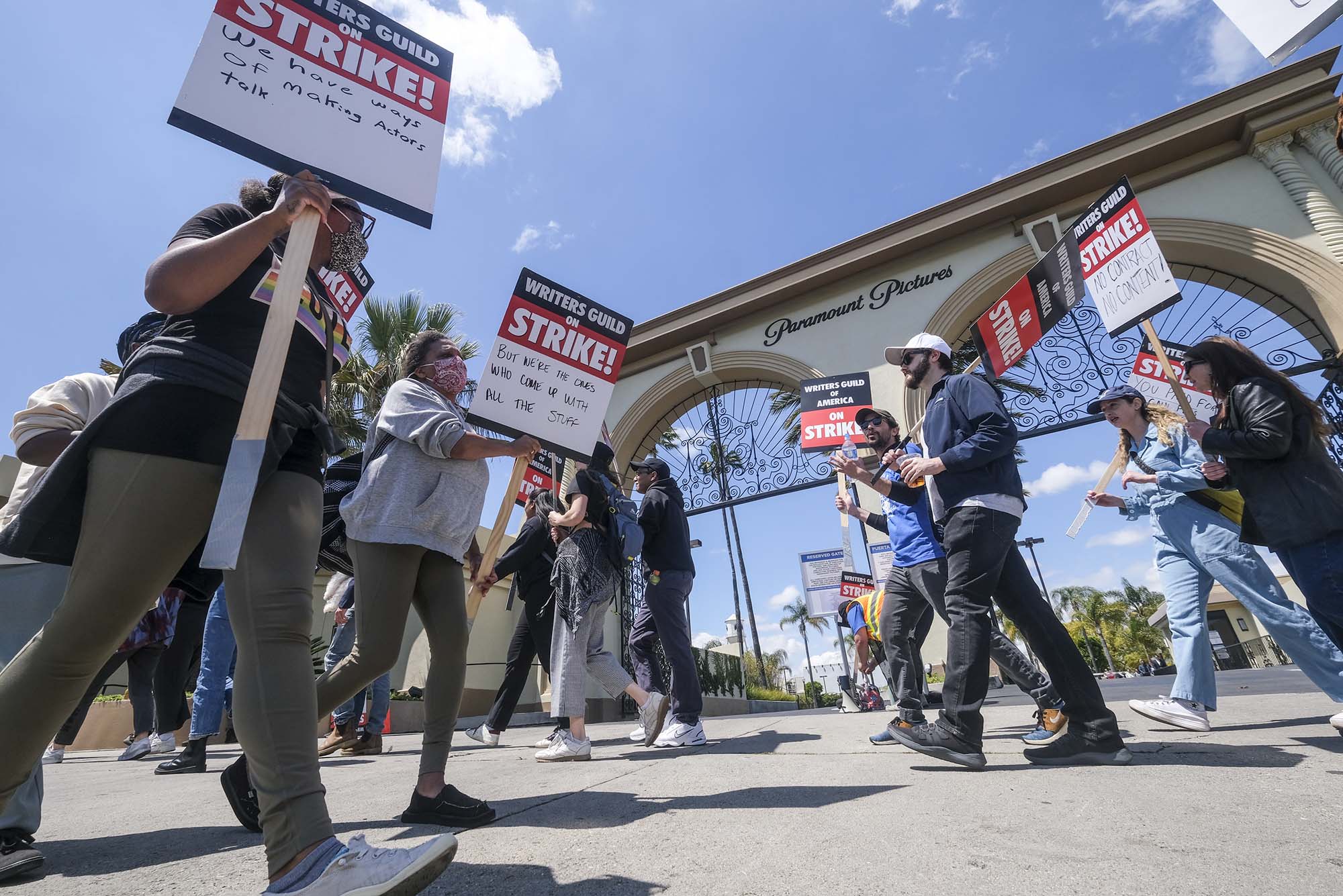Bostonia feature: For BU Alums in Hollywood, the Strike is about Survival in a Streaming, AI World

Members of the Writers Guild of America picket outside Paramount Pictures on May 5, 2023, in Los Angeles. Entertainment industry writers are on strike, and their union remains at an impasse with Hollywood studios over a host of labor issues, most notably residuals for streaming content, staffing levels in writing rooms, and the use of artificial intelligence. Photo by Ringo Chiu via AP
Bostonia feature: For BU Alums in Hollywood, the Strike is about Survival in a Streaming, AI World
They expect a summer of picketing, negotiating, protesting, and speaking out in their fight for fair wages and more
This article was first published in Bostonia on May 9, 2023. By Jim Sullivan
Excerpt
Hilary Weisman Graham, a writer/producer on Netflix’s Orange is the New Black and the co-showrunner on an upcoming CBS drama, Tracker, has a pretty good idea what she’s going to be doing this spring. “I’m going to spend a lot of time picketing,” says Graham (COM’92). “Beyond that, I’m not sure.”
It’s the same for Daria Polatin (CFA’00), a writer on Amazon Prime’s Hunters and Netflix’s Devil in Ohio. “I am on the picket line every day,” she says. “Showing solidarity, and feeling solidarity with fellow writers and supporters is incredibly invigorating.” And Erin Conley (COM’11), a writer on Netflix’s Shadow and Bone, has a temporary new job: strike captain and picket coordinator for the Writers Guild of America (WGA). She’s “been on the picket line every day.”
What Graham, Polatin, and Conley—all Boston University alums now making their living as writers in Hollywood—won’t be doing is writing scripts for TV shows and films.
They are among the 11,000-plus WGA members on strike since May 2. It’s the guild’s first strike since 2007, the action kicking in less than an hour after the Alliance of Motion Picture and Television Producers (AMPTP) announced negotiations with the WGA had concluded without an agreement.
Bostonia reached out to BU alumni working as writers in the industry to ask about the strike and its implications. While there was general optimism that it would be settled, the consensus was this strike would last a minimum of three months. As most fall series are written in May and June, that would knock a lot of those shows off the schedule.
The previous strike, which lasted 100 days, had a lot to do with how writers would be paid in the then-nascent world of streaming. The current action still concerns streaming, as it has exploded beyond expectations and yesteryear’s agreement doesn’t fit today’s reality. But newer issues are also at stake this time around: how writers are paid in the here and now, and how writers will be employed and paid in the ever-accelerating world of ChatGPT and other artificial intelligence systems.
This divide, not coincidentally, is at the heart of the angry reaction to BU’s speaker for its May 21 Commencement, David Zaslav (LAW’85), Warner Bros. Discovery president and CEO, who some writers have complained exemplifies the pay divide that’s broken in Hollywood.
Devaluation of Writers
Polatin explains how the writing process generally happens and how streaming has impacted writers: “Led by the showrunner—a writer and usually the creator of the series—the writing staff generates episodes in a writers’ room and writes the scripts, then produces the episodes, shepherding them through the postproduction process until they are ready to air.
“Then streaming companies entered the scene and found numerous ways to disrupt this model,” she says. “They have downsized the number of writers in a writers’ room and cut writers out of the producing and postproduction process, leaving the showrunner to do even more heavy lifting. They have also created ‘mini-rooms,’ where they pay writers less to develop episodes because they haven’t green-lit the show yet. The pattern is that they usually green-light the show after the staff has been let go, and the rest of the work is shouldered by the showrunner. So, since staffing jobs are shorter, and streamers can go years between seasons, the streamers are turning writing into a gig economy. If we don’t settle these terms with the studios now, screenwriting as a profession will not be sustainable.”
Peter Paige (CFA’91), showrunner and writer on Freeform’s Good Trouble, says the threat of AI is “absolutely a factor,” but he notes that writer pay has stagnated while studios have reported record profits to their shareholders. “It didn’t happen overnight,” he says, “but the devaluation of writers has led to a reality in which many of us are struggling just to get by.”How will this play out?